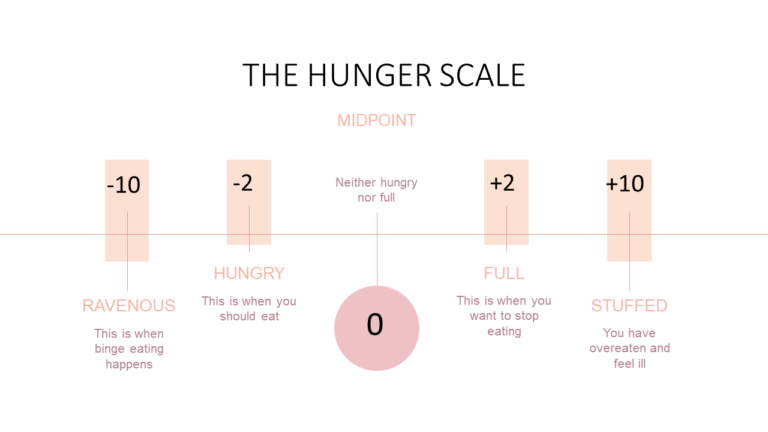The main reason we are overweight is because we overeat. For most of us, it is that simple. We eat more than our body needs. It has become perfectly normal to overeat. People are constantly pushing food on us, and we tend to feel bad if we don’t eat it. It has become the norm. Overeating has become a way to avoid pain and seek joy. The body has adjusted to accommodate overeating. We have developed habits around food and eating that typically are not healthy.
How do we stop overeating? We really have to tune in to our body and learn when it is HUNGRY and when it is not. For some of us, that will take some work, but it is totally worth it. Once you begin listening to your body’s cues, you eat only when you are HUNGRY. That is how you stop overeating.
If you think of your HUNGER as a scale, you eat only when it dips down into the HUNGER area, and stop when it is no longer HUNGRY. Don’t wait until you are starving, or eat until you are completely full. This takes some time to raise your awareness of, so pay close attention for a week or so until you get this down.

Your goal is to learn to listen to your body and eat when it starts to get HUNGRY, say -2 on the HUNGER scale, and stop eating when you are just feeling full, say +2 on the HUNGER scale. Then start to pay attention to how much food it takes to get that feeling of being full, around +2 on the HUNGER scale. Does it take 8 almonds? Or 10? Really paying attention to your body will give you the knowledge you need to change your relationship to food and your body forever.
I typically recommend eating 3 meals a day without snacks in between. For each of those meals, I recommend eating lots of vegetables, including leafy greens, a protein, and a healthy fat. In the beginning, really notice how well those meals are working with your HUNGER scale so that you can see where you might want to make adjustments. Are you getting really HUNGRY between meals? Perhaps increase your protein in your previous meal for the next day and see if that helps. Are you feeling really full after a meal, maybe +6 on the HUNGER scale? Maybe you need to reduce your portion size in the future.
Additionally, begin noticing if you are eating when you are not even HUNGRY. This is such important information for you to learn from. Are you just accustomed to waking up in the morning and eating breakfast, so you find yourself eating first thing even though you aren’t even HUNGRY?
Are you snacking when you come home from work even though you aren’t HUNGRY? When you start to notice habits like this, sit down and really consider why. What is going on? What are you thinking? What are you feeling? Are you thinking that you need to relax and unwind from your busy day and the only way you know how to do that is through food? Are you stressed? Are you thinking that a glass of wine will help you destress? Are you thinking about how hard your day was and convincing yourself that a snack or a treat will make everything better?
When you really start looking at what is going on, perhaps even writing about it in a journal, you will start to realize that those habits don’t make much sense. There are much better ways to unwind, release stress, or recover from a hectic day than to eat. Start listing out all the ways that don’t involve food, like listening to music, resting, doing yoga, chatting to a friend, etc. Replacing your unconscious eating habits with healthier choices will be a great way to combat the real reasons you are thinking or feeling that way instead of covering them up with food and extra weight. Paying attention to those thoughts and feelings will help you discover more about yourself, and the root causes that in the end you might want to deal with. Perhaps you can begin a new hobby or sport that will help you unwind. Perhaps you will start investigating ways to reduce your stress at work so that you won’t come home and feel you need a glass of wine. Perhaps you will start brainstorming ways to have more fun during the day.
Keep practicing with the HUNGER scale and working towards only eating when you are HUNGRY. Stop overeating is the best thing you can do to reach your weight goals.

